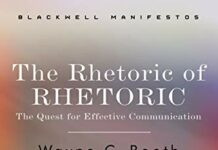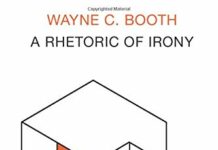
Ebook Info
- Published: 2010
- Number of pages: 574 pages
- Format: PDF
- File Size: 4.81 MB
- Authors: Wayne C. Booth
Description
The first edition of The Rhetoric of Fiction transformed the criticism of fiction and soon became a classic in the field. One of the most widely used texts in fiction courses, it is a standard reference point in advanced discussions of how fictional form works, how authors make novels accessible, and how readers recreate texts, and its concepts and terms—such as “the implied author,” “the postulated reader,” and “the unreliable narrator”—have become part of the standard critical lexicon.For this new edition, Wayne C. Booth has written an extensive Afterword in which he clarifies misunderstandings, corrects what he now views as errors, and sets forth his own recent thinking about the rhetoric of fiction. The other new feature is a Supplementary Bibliography, prepared by James Phelan in consultation with the author, which lists the important critical works of the past twenty years—two decades that Booth describes as “the richest in the history of the subject.”
User’s Reviews
Reviews from Amazon users which were colected at the time this book was published on the website:
⭐Here is what I wrote on Wikipedia about this book (I am Jstanley01 on the Page History document there):In what was likely Booth’s most-recognized book, The Rhetoric of Fiction, he argued that all narrative is a form of rhetoric.The book can be seen as his critique of those he viewed as mainstream critics. Critics according to Booth, who cites an abundant array of sources, that beginning roughly with Henry James began to emphasize the difference between “showing” and “telling” in fiction. And who have placed more and more of a dogmatic premium on “showing.”Despite the realistic effects that modern authors have achieved, according to Booth, trying to distinguish narratives in this way is simplistic and deeply flawed. He argued, citing authors of a variety of stripes, that they invariably both show and tell. And he observed that they appear to choose between the techniques based upon decisions about how to convey their various “commitments” along various “lines of interest.”Booth’s criticism can be viewed as distinct from traditional biographical criticism (still practiced, especially among popular critics), the new criticism which argued that one can only talk about what the text says, and the modern criticism which argues for the “eradication” of authorial presence. Booth claimed that it is impossible to talk about a text without talking about an author, because the existence of the text implies the existence of an author.Booth not only argued that, whether or not an author — as distinct from the narrator of a text — intrudes directly in a work, that readers will always infer the existence of an author behind any text they encounter. He also claimed that readers always draw conclusions about the beliefs and judgments (and also, conclusions about the skills and “success”) of a text’s implied author, along the text’s various lines of interest:”However impersonal he may try to be, his readers will inevitably construct a picture of the official scribe who writes in this manner — and of course that official scribe will never be neutral toward all values. Our reaction to his various commitments, secret or overt, will help to determine our response to the work.”[1]This implied author (a widely-used term that Booth coined in this book; who he also called an author’s “second self”[2]) is the one who “chooses, consciously or unconsciously, what we read; we infer him as an ideal, literary, created version of the real man; he is the sum of his own choices”[3]Booth also spent several chapters — which include numerous referrals to and citations from widely-recognized works of fiction — describing the various effects that implied authors achieve along the various lines of interest that he identifies, and the pitfalls they fall into, depending upon whether or not the implied author provides commentary, and upon the degree to which a story’s narrator is reliable or unreliable, personal or impersonal.Booth detailed three “Types of Literary Interest” that are “available for technical manipulation in fiction”:”(1) Intellectual or cognitive: We have, or can be made to have, strong intellectual curiosity about “the facts,” the true interpretation, the true reasons, the true origins, the true motives, or the truth about life itself. (2) Qualitative: We have, or can be made to have, a strong desire to see any pattern or form completed, or to experience a further development of qualities of any kind. We might call this kind “aesthetic,” if to do so did not suggest that a literary form using this interest was necessarily of more artistic value than one based on other interests. (3) Practical: We have, or can be made to have, a strong desire for the success or failure of those we love or hate, admire or detest; or we can be made to hope for or fear a change in the quality of a character. We might call this kind “human,” if to do so did not imply that 1 and 2 were somehow less than human.”[4]In the 1983 edition of The Rhetoric of Fiction, in which a lengthy addendum to the original 1961 book was published, Booth outlined various identities taken on by both authors and readers: The Flesh-and Blood Author, the Implied Author, the Teller of This Tale, the Career Author, and the “Public Myth”; and, the Flesh-and-Blood Re-Creator of Many Stories, the Postulated Reader, the Credulous Listener, the Career Reader, and the Public Myth about the “Reading Public.”[5][…]_______________________________[1] The Rhetoric of Fiction 71.[2] The term “second self” was brought into prominence by Kathleen Tillotson (1959), see Tom Kindt, Hans-Harald Müller, The Implied Author: Concept and Controversy (2006) p. 50).[3] The Rhetoric of Fiction 74-75.[4] The Rhetoric of Fiction 125.[5] The Rhetoric of Fiction 428-421.
⭐Although this second edition was written in 1983 and so the art and rhetoric of fiction in the modern day may have well changed in the past nearly 40 years, I think that Wayne C. Booth’s The Rhetoric of Fiction is quite a detailed, well-researched and thought-provoking work in terms of analysis and criticism of the craft of writing fiction. For this as much as anything, it does still have a relevance and value.I will admittedly say that this book is quite erudite and dense; Booth is quite intricate, meticulous, and detailed throughout the book. In this way, the book is particularly challenging because of its depth, and so I had to take this book in exceedingly small mouthfuls each day, rather than huge gulps. For that reason, it took me over a month or so to read because I was reading other works alongside this one and did not want to overwork my brain.I think there is quite a bit of value here, mainly because there is just a preponderance of information and examination of all that is in how fictional form works, and the relationship an author has with her or her audience when the present a work. Through the author’s rhetoric—which may come in the form of various methods—the author shapes their novel and what they want the reader to take from their work. There are many points on how an author give a voice to themselves within the framework of their novel.Booth seems to have done extensive research within this work, and this is observed in the various works he references at length. He utilizes the works of Henry James quite frequently, for instance, as well as referencing several other key classic and more modernistic authors and their works. There are many focal points within The Rhetoric of Fiction, so I think each reader can take a chapter that delves into something they find of interest. And, while it was a challenging book to read (not light reading here at all), there are so many interesting thinking points contained within in a book about books.The chapters themselves dig into various methods the author crafts their work. For example, there are chapters that examine “telling vs. showing”, various forms of narration, author’s intended commentary, the unreliable narration, etc.Overall, The Rhetoric of Fiction is a book that makes one appreciate the value of how a novelist comes to terms with how he or she writes, and what the reader takes from the novel as a result.
⭐While I haven’t yet finished reading it, it brings a much valued analysis on the process of literary creation. It doesn’t get five stars because, while leaning very much in the rhetorical techniques a writer may employ, the book doesn’t adress much of literature as the art of speech, and doesn’t bring much comentary on other theoretical views that completely separate author and narrator.
⭐Think the author does great job of vetting out the long-running discussion/argument over narrative and writing as an art form. He convinced me that writing as pure art without the author imparting any his views or feelings is not practical nor probably desired. I am sure there will be those who continue to strive for the ideal, but after reading this book, I will not be one of them.
⭐This book gives insightful information. As the author claims, he should have named it “A” Rhetoric of Fiction, rather than “The” Rhetoric of Fiction. It is not an end-all, but good information along the path of fiction writing.
⭐Wayne Booth dives into the dynamics of what’s happening in the text — what readers get out of it, what writers put into it. This is an academic book. It’s not light reading. But for those who wish to delve into rhetorical criticism, and writers who want a powerful way to understand the dynamics between author<->text<->reader, this is a must-have.
⭐Wayne Booth’s The Rhetoric of Fiction (1961)is a classic in the history of literary criticism and doesn’t need a reference from me. I reread it recently as background for a personal essay I am writing about the 60’s. I’m even more impressed now than when I first read it more than fifty years ago.
⭐The book is excellent. It’s clear and provides examples for every concept.
⭐This is a serious analytical study of voice in narrative. Useful for literary academic study – a great starting point for research.
⭐Great book
⭐Good for scholars and writers.
Keywords
Free Download The Rhetoric of Fiction 2nd Edition in PDF format
The Rhetoric of Fiction 2nd Edition PDF Free Download
Download The Rhetoric of Fiction 2nd Edition 2010 PDF Free
The Rhetoric of Fiction 2nd Edition 2010 PDF Free Download
Download The Rhetoric of Fiction 2nd Edition PDF
Free Download Ebook The Rhetoric of Fiction 2nd Edition

